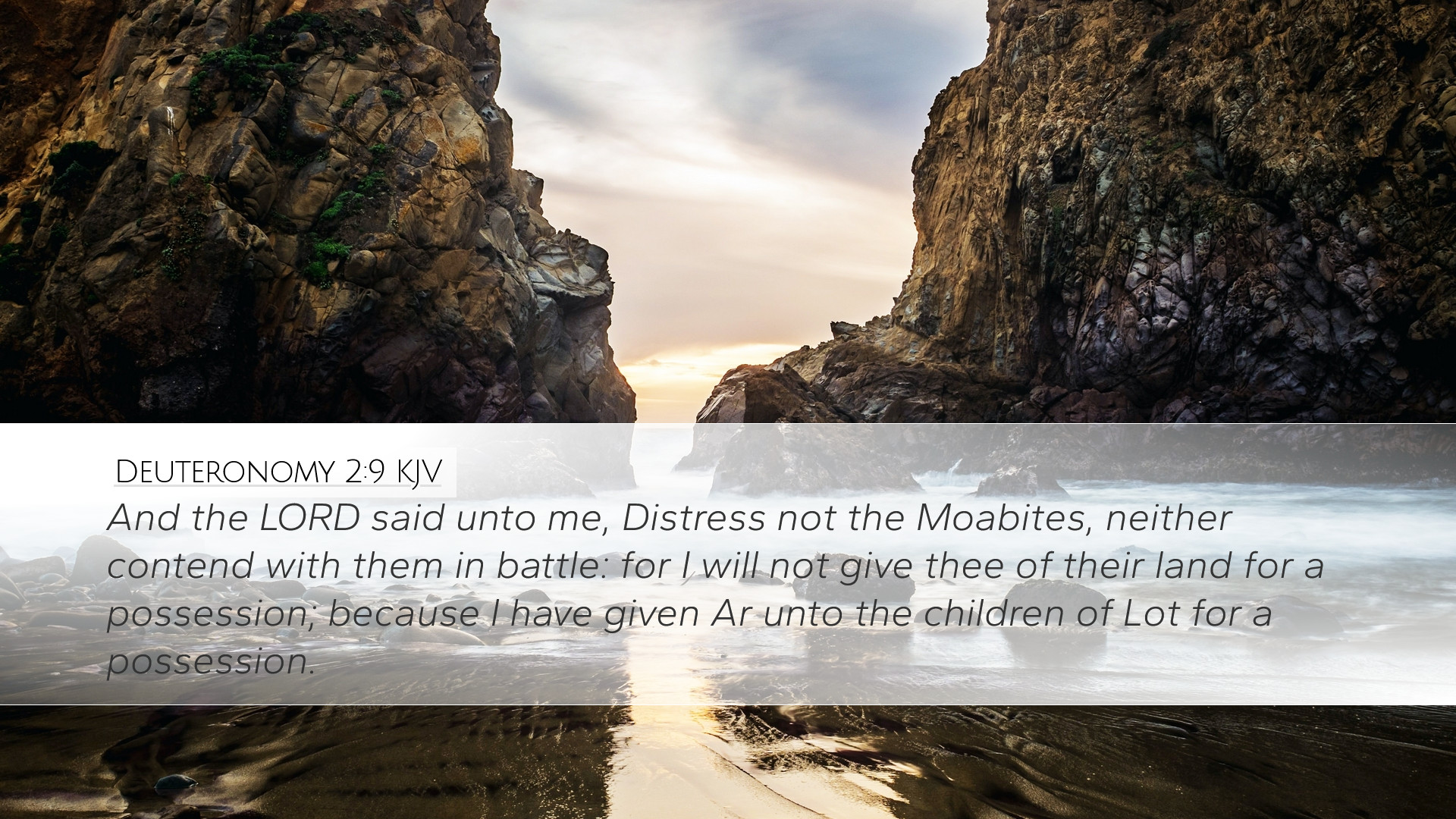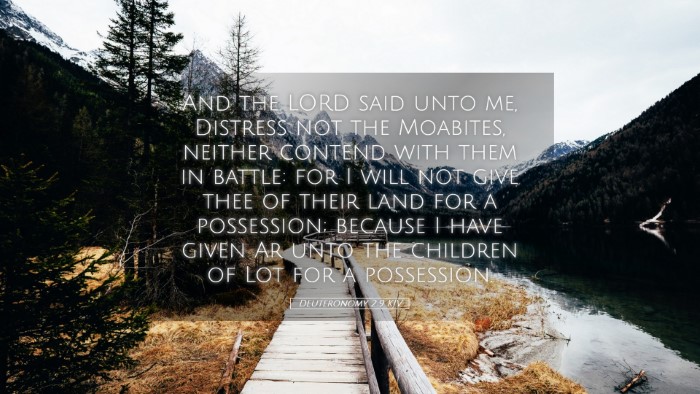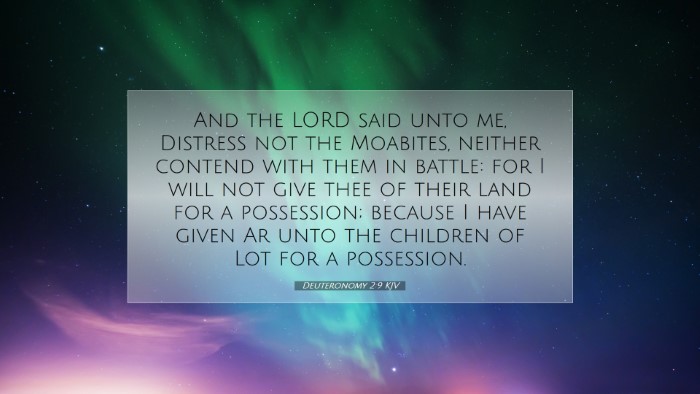Commentary on Deuteronomy 2:9
Text of the Verse: "And the LORD said unto me, Distress not the Moabites, neither contend with them in battle: for I will not give thee of their land for a possession; because I have given Ar unto the children of Lot for a possession."
Introduction
The verse in Deuteronomy 2:9 reveals significant theological implications pertaining to divine guidance, Israel's territorial boundaries, and the understanding of God's sovereign will regarding the nations. This commentary synthesizes insights from prominent commentators such as Matthew Henry, Albert Barnes, and Adam Clarke to provide a rich exploration of the text.
Historical Context
The context of this directive to the Israelites occurs as they journey towards the Promised Land. The Moabites, descendants of Lot, are seen not merely as an antagonistic entity but also as a part of God’s divine plan. The Lord’s command highlights a critical moment during Israel's wilderness wanderings, illustrating His control over the fate of nations.
Insights from Matthew Henry
Henry emphasizes the mercy of God in His dealings with the Moabites. He notes that despite the enmity that often existed between Israel and surrounding nations, God commanded them not to engage in hostilities against Moab. This reflects God's justice and the recognition that the land of Moab was not intended for Israel's possession. Henry posits that this instruction reveals God's intention to reserve certain lands for specific peoples, reaffirming that territory is a divine allotment.
Thoughts from Albert Barnes
Barnes elaborates on the significance of Ar, the capital of Moab, stressing that this location carries a historical weight as Lot's inheritance. By declaring that Israel should not contend with Moab, God emphasizes His provision for the people of Lot. Barnes argues that the prohibition against conflict underscores a broader theme of God’s sovereignty and the idea that the success and boundaries of nations are ordained by divine decree.
Reflections from Adam Clarke
Clarke takes a more practical approach, interpreting God’s directive as a lesson in obedience and trust. He suggests that the Israelites were to recognize that their victory and possession were dependent on God’s will alone. Clarke underscores the necessity of discerning when to engage and when to desist, highlighting the importance of heeding God's instructions in their journey toward the land promised to them. He further notes that this serves as an important precedent in the relationship between Israel and surrounding nations in both historical and prophetic contexts.
Theological Significance
This instruction encapsulates a deeper theology of God’s sovereignty paired with His mercy. The stipulation not to harass the Moabites is a testimony to God’s broader redemptive plan. Simply put, God’s management of boundaries and peoples reveals His control over history and His purpose for each nation.
God’s Sovereignty Over Nations
The declaration that the Moabites should not be disturbed reveals God’s sovereignty, as He has assigned their land to them. The invocation of His divine edict bolsters the understanding that God orchestrates the affairs of nations according to His will. This is a reassurance for Israel that their eventual inheritance of their own land is guaranteed by the same divine governance.
Mercy and Justice
This passage illustrates the duality of God's character - His mercy towards the Moabites is coupled with justice. Disturbing them would not only violate God's order but also negate the opportunity for the Moabites to acknowledge the God of Israel's authority over their territory.
Lessons in Warfare and Conduct
The commandment serves as a precedent for how Israel should conduct itself toward other nations. It emphasizes considerations of divine instruction over personal desires for conquest. This theological motif stresses the importance of moral conduct and divine-favored warfare, insisting that success is not merely based on military strength but on adherence to divine will.
Practical Applications
- Divine Guidance: The importance of seeking God’s direction in all endeavors. Just as Israel was guided to avoid conflict, we too should seek God’s wisdom in our decisions.
- Understanding Boundaries: A recognition that God has designated specific roles and boundaries for every nation and individual, which we must respect.
- Mercy in Relationships: Applying the principle of mercy in our interactions, particularly with those we may consider enemies or competition.
- Obedience to God’s Voice: Prioritizing God’s voice over our impulses and desires, recognizing that His wisdom surpasses our understanding.
Conclusion
Deuteronomy 2:9 ultimately reveals a multifaceted understanding of God’s engagement with humanity. As we delve into the lessons from this passage, we are reminded of God’s sovereignty, justice, and mercy, which should guide our actions and decisions in our spiritual and communal lives. The exhortation against warfare with the Moabites stands as a significant declaration of how God’s people are to interact with others, solidifying the foundational understanding that all land and nationhood rests under the authority of Divine will.


